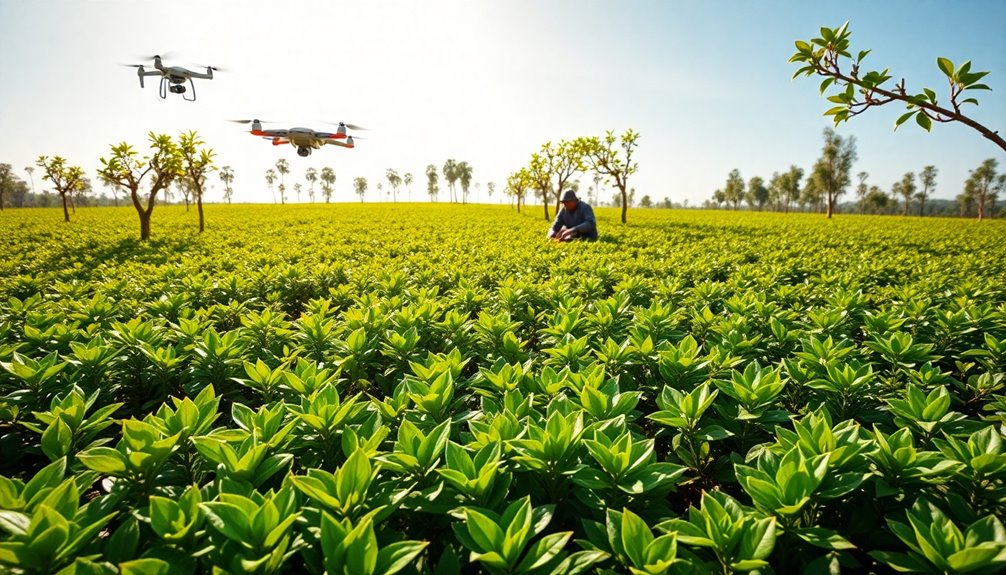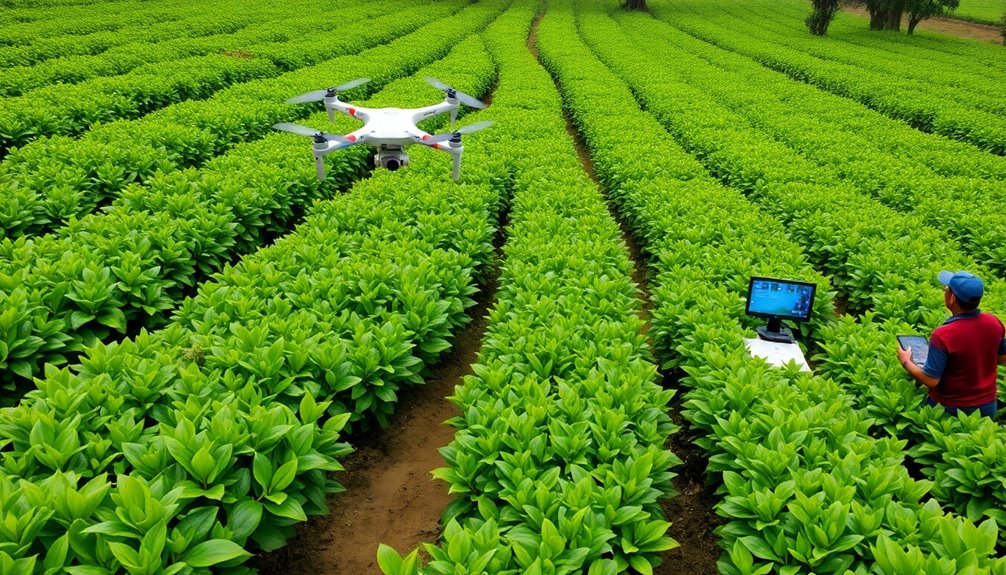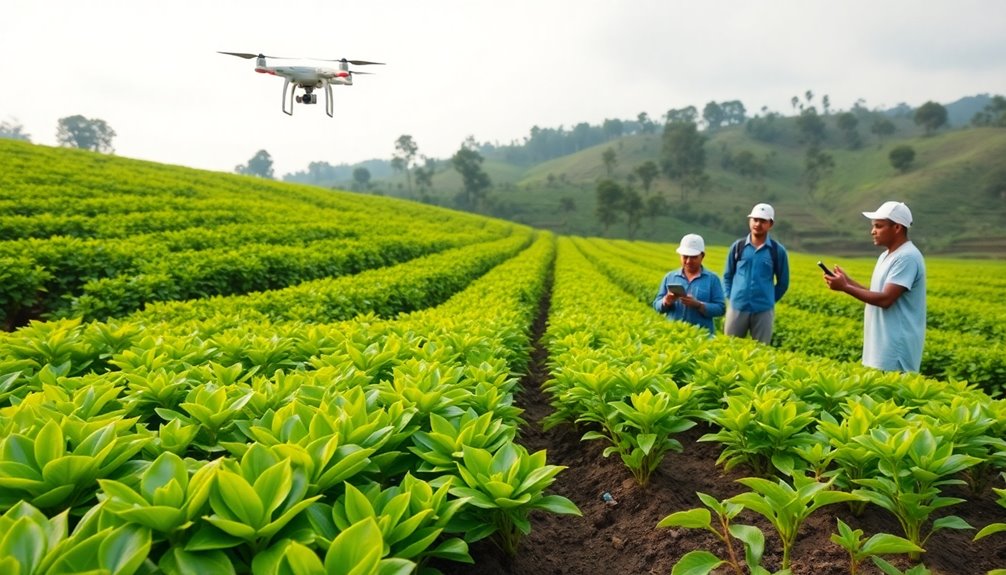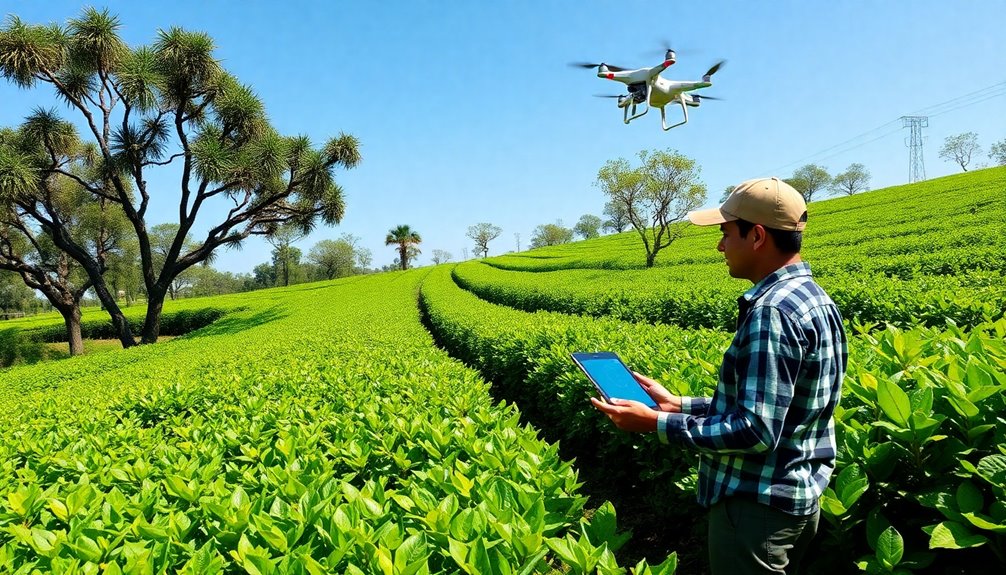AI is helping you grow better tea in many ways! It uses drones to check soil health and moisture, so you know exactly when to water. Predictive analytics give you accurate weather forecasts to help with planting and harvesting. AI can even spot diseases early by analyzing images, saving your crops from loss. Automated systems can identify the ripest tea leaves for harvest, making your job easier, especially with fewer workers available. Plus, AI encourages eco-friendly pest control, reducing chemical use. There's so much more to explore about AI's role in tea farming, so keep on discovering!
Key Takeaways
- AI-powered drones assess soil health and moisture levels, enabling farmers to make informed decisions about irrigation and nutrient management.
- Predictive analytics provide accurate weather forecasts, helping farmers optimize planting and harvesting schedules for better yields.
- Machine learning algorithms detect early signs of diseases through satellite and drone imagery, allowing for timely intervention and reduced crop loss.
- Automated quality control systems ensure only the highest-quality tea leaves are processed, improving overall product standards.
- AI-driven pest management solutions utilize real-time data to identify and address pest threats, minimizing reliance on chemical pesticides.
Introduction

In the vibrant fields of tea farming, technology is transforming the way growers manage their crops. You might be surprised to learn that AI is playing a huge role in this change. By using AI-powered drones and sensors, tea growers can assess soil health, moisture levels, and even pest risks. This leads to better resource management and healthier tea plants.
With predictive analytics, you can get accurate weather forecasts. This helps tea growers make smart decisions about when to plant and harvest, boosting crop yield even in tough conditions.
Plus, machine learning algorithms analyze satellite and drone images, helping detect diseases early. This means less crop loss and a smaller need for pesticides.
Quality control is also getting a tech upgrade! Innovations like ProfilePrint speed up the testing of tea samples, ensuring consistency across the supply chain.
Imagine having faster and more accurate quality checks alongside human tasters!
Labor Shortages in Tea Cultivation

Facing labor shortages in tea cultivation can be daunting for growers, especially as the demand for tea continues to rise.
In regions like India, Sri Lanka, and Kenya, labor challenges in tea are becoming increasingly problematic. Traditional hand-picking of tea leaves is essential for high-quality production, but it's getting harder to maintain due to rising costs and fewer available workers.
This is where AI in tea production comes into play. AI can help you tackle these labor shortages by using automated harvesting systems that boost productivity.
These smart tools employ computer vision and machine learning to identify the ripest tea leaves, ensuring you still get high-quality tea, even with fewer hands on deck.
Increased Tea Yield Efficiency

As the demand for high-quality tea grows, leveraging AI technology can significantly enhance yield efficiency for growers.
You can use AI-powered drones to monitor soil health and moisture levels, helping you make informed decisions that boost your tea yield efficiency. Predictive analytics forecast tea yields, using historical data and weather patterns. This allows you to plan your harvest effectively, avoiding both overproduction and shortages.
Machine learning algorithms analyze satellite and drone imagery, detecting early signs of diseases. This means you can reduce crop loss and improve overall yield.
Moreover, automated quality control systems use computer vision to ensure only the best leaves are processed, enhancing your product standards while minimizing waste.
AI also optimizes your irrigation schedules, ensuring that your tea plants receive the right amount of water. Plus, it suggests eco-friendly pest control methods, supporting sustainable practices in your tea cultivation.
Ai-Driven Pest Management Solutions

AI-driven pest management solutions are revolutionizing how you protect your tea crops from infestations. By using machine learning algorithms, these advanced tools analyze data collected from sensors and drones. This allows for early detection of pest infestations in your tea plantations, which helps reduce crop loss and pesticide usage.
Computer vision systems are also part of the game. They identify specific pests and diseases on your tea plants, enabling you to target interventions precisely. This minimizes the environmental impact of your farming practices.
Plus, AI tools can predict pest outbreaks by analyzing historical data and weather patterns. This means you can implement preventative measures before infestations occur.
With automated data collection, you gain real-time monitoring of pest populations. This supports timely and effective responses to pest threats.
Integrating AI in your pest management strategies not only improves the health and yield of your tea crops but also promotes sustainable farming practices. By reducing reliance on harmful chemical pesticides, you're not just protecting your crops; you're also taking care of the environment.
Embrace these AI-driven pest management solutions to ensure a thriving and sustainable tea plantation!
Ethical Implications of Automation

The rise of automation in tea farming brings a host of ethical implications that can't be overlooked. While AI helps overcome labor shortages and boosts productivity, it also risks displacing traditional jobs, especially in communities that rely on agricultural work. This change can create social impacts that affect families and local economies.
You might wonder about the initial investment costs of AI tools. They can be high, making it tough for small-scale farmers to adapt. This could widen the economic gap in the tea industry.
To address these challenges, retraining programs are essential. They can help workers transition into new roles, ensuring that automation doesn't lead to social inequities.
As we move forward, it's crucial to balance technological advancements with social responsibility. Ongoing dialogue among farmers, technology developers, and local communities is key. Together, you can develop sustainable practices that benefit everyone.
Practical Applications

With ethical considerations in mind, farmers are now turning to practical applications of AI to enhance their operations. AI technology is revolutionizing tea production by making it smarter and more efficient. For instance, AI-powered drones and sensors monitor soil moisture, temperature, and plant health. This helps you make informed decisions about irrigation and fertilization, leading to healthier tea crops.
Machine learning plays a big role here too. It analyzes satellite and drone images for early disease detection, which means less reliance on pesticides and better crop quality.
When it comes to quality testing, tools like ProfilePrint analyze tea samples quickly, ensuring consistency and reducing testing costs.
You can also benefit from AI-driven predictive analytics, which forecasts tea yields and market demand. This allows you to plan your harvest effectively, avoiding overproduction or shortages.
Lastly, automated harvesting systems use computer vision to pick only the best tea leaves based on size, color, and texture. These practical applications not only improve the sustainability of tea production but also reduce the environmental impact of tea farming, ensuring a brighter future for everyone involved.
Frequently Asked Questions
How Does AI Help Farmers?
AI helps you by providing data-driven insights, optimizing resource management, detecting diseases early, and forecasting yields. It streamlines processes, enhances decision-making, and promotes sustainable practices, ensuring you achieve better productivity and efficiency in your farming.
How Does Technology Help in the Tea Manufacturing Process?
Technology streamlines the tea manufacturing process by automating quality control, enhancing real-time tracking, and utilizing predictive analytics. You'll see improved efficiency, reduced costs, and better consistency, ultimately ensuring a higher quality product reaches consumers.
What Is the Application of Artificial Intelligence in Agriculture?
Artificial intelligence in agriculture helps you optimize resource management, monitor crop health, and predict yields. It analyzes data from drones and sensors, enabling you to make informed decisions and improve overall farming efficiency and sustainability.
What Is the Role of Artificial Intelligence in Precision Agriculture?
Artificial intelligence plays a crucial role in precision agriculture by providing you with data-driven insights. It helps you optimize resource usage, monitor crop health, predict yields, and automate processes, ultimately enhancing productivity and sustainability in your farming practices.
Conclusion
AI is truly changing the way tea is grown! By helping farmers deal with labor shortages, boost yields, and manage pests, it makes tea cultivation more efficient and sustainable. As you learn more about these technologies, you can appreciate how they improve the quality of tea while addressing important ethical concerns. So, whether you're sipping your favorite cup or just curious, remember that AI is playing a big role in making tea better for everyone!










